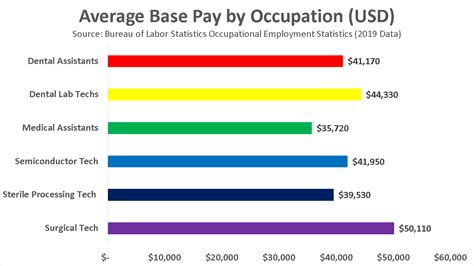The medical field offers numerous career paths that are both rewarding and in-demand. Two such careers that often get confused with each other are Surgical Technologists (Surgical Techs) and Sterile Processing Technicians (Sterile Processing Techs). While both roles are crucial in the healthcare industry, they differ significantly in terms of responsibilities, requirements, and compensation. In this article, we'll delve into the details of each profession and provide a comprehensive salary comparison.
Understanding the Roles
Before we dive into the salary comparison, it's essential to understand the responsibilities and requirements of each profession.
Surgical Technologists (Surgical Techs)
Surgical Technologists, also known as Operating Room Technicians, are medical professionals who assist surgeons, anesthesiologists, and nurses during surgical procedures. Their primary responsibilities include:
- Preparing operating rooms and equipment for surgery
- Maintaining a sterile environment during surgery
- Passing instruments and supplies to surgeons during procedures
- Assisting with patient care and preparation for surgery
- Maintaining accurate records of surgical procedures
To become a Surgical Technologist, one typically needs to:
- Earn a post-secondary certificate, diploma, or associate's degree in surgical technology
- Obtain certification through the National Board of Surgical Technology and Surgical Assisting (NBSTSA)
- Maintain certification through continuing education and professional development
Sterile Processing Technicians (Sterile Processing Techs)
Sterile Processing Technicians, also known as Central Service Technicians, are responsible for sterilizing and preparing medical equipment and supplies for use in healthcare facilities. Their primary responsibilities include:
- Cleaning, disinfecting, and sterilizing medical equipment and supplies
- Packaging and labeling sterilized items for distribution
- Maintaining accurate records of sterilization and distribution
- Assisting with inventory management and supply chain logistics
To become a Sterile Processing Technician, one typically needs to:
- Earn a post-secondary certificate, diploma, or associate's degree in sterile processing technology
- Obtain certification through the Certification Board for Sterile Processing and Distribution (CBSPD)
- Maintain certification through continuing education and professional development
Salary Comparison
Now that we've covered the responsibilities and requirements of each profession, let's compare the salaries.
National Average Salaries
According to the Bureau of Labor Statistics (BLS), the national average salary for Surgical Technologists is around $49,000 per year. In contrast, the national average salary for Sterile Processing Technicians is around $44,000 per year.
Salary Ranges by Industry
Salaries can vary significantly depending on the industry, location, and employer. Here are some salary ranges for Surgical Technologists and Sterile Processing Technicians in different industries:
| Industry | Surgical Technologists | Sterile Processing Technicians |
|---|---|---|
| Hospitals | $45,000 - $65,000 | $40,000 - $60,000 |
| Outpatient Care Centers | $50,000 - $75,000 | $45,000 - $70,000 |
| Physician Offices | $55,000 - $80,000 | $50,000 - $75,000 |
| Medical Device Manufacturing | $60,000 - $90,000 | $55,000 - $85,000 |
Salary Ranges by Location
Salaries can also vary significantly depending on the location. Here are some salary ranges for Surgical Technologists and Sterile Processing Technicians in different cities:
| City | Surgical Technologists | Sterile Processing Technicians |
|---|---|---|
| New York City, NY | $60,000 - $90,000 | $55,000 - $85,000 |
| Los Angeles, CA | $55,000 - $85,000 | $50,000 - $80,000 |
| Chicago, IL | $50,000 - $80,000 | $45,000 - $75,000 |
| Houston, TX | $45,000 - $75,000 | $40,000 - $70,000 |
Growth Prospects
Both Surgical Technologists and Sterile Processing Technicians are in-demand professions with strong growth prospects. According to the BLS, employment of Surgical Technologists is projected to grow 3% from 2020 to 2030, while employment of Sterile Processing Technicians is projected to grow 10% during the same period.

Conclusion
In conclusion, while both Surgical Technologists and Sterile Processing Technicians play critical roles in the healthcare industry, they differ significantly in terms of responsibilities, requirements, and compensation. Surgical Technologists tend to earn higher salaries, especially in hospitals and outpatient care centers. However, Sterile Processing Technicians have stronger growth prospects and may have more opportunities for advancement.
Ultimately, the choice between a career as a Surgical Technologist or a Sterile Processing Technician depends on individual preferences and goals. Both professions offer rewarding and challenging work environments, and individuals who are passionate about healthcare and patient care may find either career path fulfilling.
Gallery of Surgical Tech and Sterile Processing Tech Images






FAQ Section
What is the average salary for Surgical Technologists?
+The national average salary for Surgical Technologists is around $49,000 per year.
What is the average salary for Sterile Processing Technicians?
+The national average salary for Sterile Processing Technicians is around $44,000 per year.
What are the growth prospects for Surgical Technologists and Sterile Processing Technicians?
+Employment of Surgical Technologists is projected to grow 3% from 2020 to 2030, while employment of Sterile Processing Technicians is projected to grow 10% during the same period.
